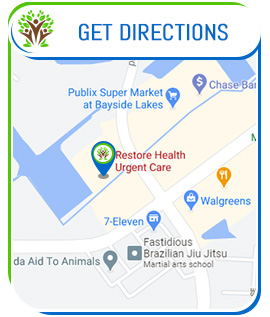Dehydration Treatment Clinic in Palm Bay, FL
Dehydration occurs when you fail to consume sufficient amounts of water or lose more fluids than you’ve taken in. Sweat, tears, vomiting, urination, and diarrhea all cause fluid loss. The degree of dehydration can be determined by a variety of factors such as climate, physical activity level, and food. Looking for an effective treatment for dehydration? Visit Restore Health Urgent Care; our medical team can help you determine the best treatment plan for you. For more information, contact us or schedule an appointment online. We are conveniently located at 1840 Eldron Blvd SE. Suite 1 Palm Bay, FL 32909.




Dehydration is when your body is using more water than you are taking in. Dehydration often happens when a person is vomiting, has diarrhea or is simply not drinking enough water. Symptoms include dizziness, weakness ,and fainting.
If you are dehydrated, drinking water or sports drinks can help. Cooling down your body temperature can also help. Medical care might be needed on some occasions, especially if there is a high fever.
Causes of Dehydration
We lose water every day in through the water vapor in the breath we exhale, when we sweat, and urinate, and water is also lost in stools. When we lose more water than our bodies are using, we may become out of balance or dehydrated. Severe dehydration is a serious matter and can lead to death.
Some causes of dehydration are fever, heat exposure, and too much exercise. Vomiting or diarrhea, and increased urination due to infection can also be big triggers of dehydration. People who have diabetes struggle with getting their bodies enough water. People who are disabled, in a coma, on a respirator, or in other similar situations, and unable to seek appropriate water and food tend to have more issues with dehydration. Some people simply do not have access to safe drinking water.
Those who have serious injuries to the skin, such as burns or mouth sores, or severe skin diseases or infections lose water through the damaged skin and are more susceptible to dehydration. It can take only 30 minutes to get dehydrated while exercising. Exercise indoors when it’s too hot and humid, or do a lighter workout outdoors.
Preventing Dehydration
The best treatment for dehydration is prevention. Plan to make sure you get the water your body needs. Take extra water to sporting events, outdoor events, and work where increased sweating, activity, and heat stress will contribute to the body losing water.
Don’t exercise during high-heat weather. Listen to weather forecasts for high-heat stress days, and move event plans inside if it’s too hot outside. Help older people and children to make sure they have enough drinking water and fluids available, and help them as needed. Any incapacitated or impaired person should be assisted to drink and be provided with adequate fluids.
Avoid alcohol consumption, especially when it’s warm. Alcohol increases water loss and impairs your ability to sense when you are becoming dehydrated. Wearing light-colored loose-fitting clothes helps if you have to be outdoors when it is hot outside. Carry a personal fan or mister to cool yourself. Find air-conditioned or shady areas and give yourself a break to cool between heat exposures. Taking someone into a cooled area for just a couple of hours here and there will help prevent the effects of high heat exposure.
Symptoms of Dehydration
Symptoms of dehydration range from minor to severe. The first common sign is being thirsty. A dry mouth and swollen tongue are signs of getting more water to the body. Weakness and dizziness are increasing concerns that a person is not getting enough water. If you are dehydrated, for example, you may feel dizzy and faint after standing up. Serious symptoms include palpitations (feelings that the heart is pounding or jumping), confusion, sluggishness or fainting, not being able to sweat, or decreased urination. Urine color could also indicate the state of dehydration. If urine is deeply yellow, amber, or concentrated, you may need to see a doctor.
When to See a Doctor
Call your doctor if the dehydrated person experiences any of the following:
- Constant or increased vomiting for more than one day
- Fever of more than 101°F
- Diarrhea for more than 2 days
- Sudden weight loss
- Decreased urine output
- Confusion
- Weakness
If a person experiences a fever higher than 103°F, confusion, sluggishness, headache, seizures or difficulty breathing, chest or abdominal pain, fainting, or if they haven’t passed urine in 12 hours, take them to the doctor immediately. For more information, contact us today or visit us online to book an appointment. We are conveniently located at 1840 Eldron Blvd SE. Suite 1 Palm Bay, FL 32909. We serve patients from Palm Bay FL, Melbourne FL, Malabar FL, June Park FL, Grant-Valkaria FL, and surrounding areas. Walk-ins Welcome.
Additional Services You May Need



